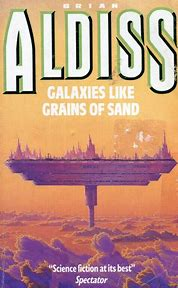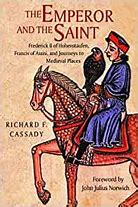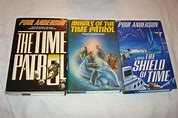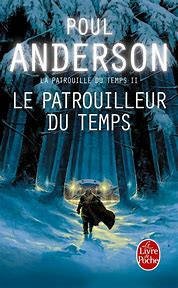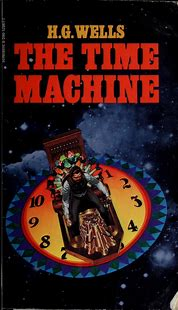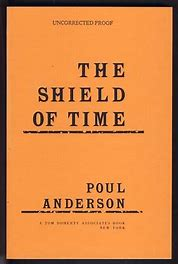Thursday, 30 June 2022
Beginnings Of Future Histories II
Wednesday, 29 June 2022
Beginnings Of Future Histories
Poul Anderson's Technic History begins with a sense of excitement about the move into space. The introduction to the first Nicholas van Rijn collection begins:
Heinlein And Anderson
Authors Who Link Time Travel To Future History
Time In Fact And Fiction
Given that the future is multiple option, sf authors write alternative fictional futures and future histories. We should not want any author's works to comprise a single future history but should regard them as multiple options with a single creator. We appreciate reminders and parallels like a Solar Commonwealth both in Poul Anderson's Technic History and in his Time Patrol series.
Tuesday, 28 June 2022
Uniforms
At the Time Patrol Academy, Dard Kelm wears:
"...a skin-tight gray uniform with a deep blue cloak which seemed to twinkle, as if it had stars sewn in." (2, p. 7)
When Everard and Whitcomb hunt in the Oligocene:
"Both wore Academy uniform, light grays which were cool and silky under the hot yellow sun." (2, p. 15)
When two Patrolmen arrive to arrest Everard and Whitcomb, they wear:
"...Patrol gray..." (6, p. 50)
Belatedly, we are told in The Shield Of Time that an hourglass in a shield is:
"...the emblem of the Patrol, the insigne on uniforms that were seldom worn." (p. 296)
That emblem will have to be shown from the beginning in any screen or graphic adaptation. The image shows the shield of time on Everard's timecycle.
A Kind Of Policeman
Mr. Gordon says too much when recruiting Manse Everard. He tells him that he is:
"'...going to be a kind of policeman... Everywhere. And everywhen.'" (1, p. 5)
No, he is not, not immediately. Everard, like all of his class, begins as a attached agent, remaining in his own period, his first task merely to read newspapers looking for signs of time travel.
"'Your work will be mostly in your own eras, unless you graduate to unattached status. You will live, on the whole, ordinary lives...'" (2, p. 11)
At the very end of the story, Everard is told:
"'You've shown yourself obviously unfit for steady work.'" (6, p. 53)
But:
"'You'll want more training, of course. Your type of personality goes best with Unattached status - any age, any place, wherever and whenever you may be needed. I think you'll like it.'" (ibid.)
- which is what Gordon had said, prematurely.
Even if the Patrol does not usually look ahead, they obviously knew what they were getting with Everard and Whitcomb. The Danellian says that Everard's appeal on behalf of Whitcomb:
"...was known and weighed ages before you were born...'" (6, p. 51)
The Danellians exist over a million years after us, not ages before us, but of course they can time travel. They also knew of a discrepancy in Whitcomb's record but waited to see what Everard would do to rectify it.
Everard and Whitcomb were sent off on a dangerous mission as if at least one of them were already Unattached - but without proper preparation and no backup. Mainwethering told them that the stolen time shuttle had been recovered by two Patrolmen named Everard and Whitcomb before they had even set off. He should not have done that, either.
The Patrol already knew that they would lose Whitcomb but gain Everard as:
A Sense Of Adventure
The Future History Idea
Only The Green Hills of Earth really conforms to this template. The Man Who Sold The Moon describes earlier technological advances whereas later volumes focus mainly on large scale political events: the Second American Revolution and the subsequent persecution and interstellar exile of the Howard Families.
This Future History idea really belongs in a multi-volume series whereas Heinlein's Future History, four and a half volumes, became only a small part of his complete works. Poul Anderson's History of Technic Civilization is a fuller embodiment of the idea despite being dominated as it is by three series characters, van Rijn, Falkayn and Flandry.
Anderson's equivalent of The Green Hills Of The Earth is The Earth Book Of Stormgate. In the Earth Book, the opening story, "Wings of Victory," helps to set the scene by introducing the Ythrians and mentioning the planets, Cynthia, Woden and Hermes. "The Problem of Pain" features an Aenean on Avalon. "How To Be Ethnic In One Easy Lesson" shows domestic life in the Solar Commonwealth, giving the future a daily life, as was claimed for Heinlein. "The Season of Forgiveness" is a Christmas story set on an extra-solar planet. There is very little in the way of continuing characters among these early Technic History stories. We do not yet realize how important van Rijn will become.
Anderson fulfils Heinlein's idea.
The Lives And Times Of Dan, Part II
If he returned from the past to Deirdre's home timeline, then he would be able to join Patrol agents at the lodge or the Academy and to help with the intervention in the Second Punic War. However, he would need to know when to arrive at the lodge or the Academy. Otherwise, he would merely be disturbing agents who knew nothing of the temporal alteration.
If Dan never travelled into the past but remained permanently in the Danellian era, then he would not know of any alternative timelines.
The Danellians must found the Patrol because they want to ensure that they will always be free to travel into the past and then to return to their home era.
The Lives And Times Of Dan
The Time Patrol Academy exists for 500,000 years:
Danellians And Quantum Mechanics
Monday, 27 June 2022
Wanda In Wind And Winter
The Shield Of Time.
Manse Everard asks Wanda Tamberly what is haunting her. When she responds that he observes more than he pretends:
"The wind nearly stole her words from him, as low as they were. It shrilled and boomed above rumbling surf, sheathed faces in cold, laid salt on lips, ruffled hair." (p. 431)
This time, the wind's role is to emphasize that Tamberly is indeed subdued. She speaks so low as to be scarcely audible. However, when she at last articulates her feelings and then breaks off:
"Her voice had been rising into the wind." (p. 433)
The Danellian appears and reassures both. As he does:
"The wind cried, the sea growled nearer." (p. 434)
Wind and sea represent chaos which approaches and threatens even while the Danellian affirms that the Patrol has overcome it. By the end of this chapter and thus also of the novel, Tamberly's disquiet is healed. Despite all the shrilling, booming and rumbling of winter:
"'...this is a lovely coast, Manse. Let me show you.'" (p. 436)
Quanta And Lorenzo
The Shield Of Time.
In the Danellian timeline, Lorenzo de Conti neither kills Roger II nor marries Ilaria di Gaetani. A quantum fluctuation in Lorenzo's brain causes him to attack Roger II at Rignano, thus initiating the Alpha timeline. When Manse Everard averts that timeline, another quantum fluctuation in Lorenzo's brain causes him to accept betrothal to Ilaria, thus initiating the Beta timeline. When Everard, while averting this second divergence, accidentally kills Lorenzo, the latter's death prevents his brain from generating a Gamma timeline. Consequently, reality reverts to the Danellian timeline. Does that account finally bring together the two levels of description of reality?
Levels Of Description And Lorenzo De Conti
The Shield Of Time.
A material object or process can be described on increasing scales:
January-February-March, 1990
Lorenzo And Religion
Angels And Gods
"Tamberly had proposed taking Lorenzo back in time and making him decline the proffered marriage at the outset." (p. 426)
If they took Lorenzo back in time, then he would coexist with his younger self so what would they do with the younger Lorenzo? Kill or kidnap him?
Everard as an angel:
"'Sinner, beware!... Hell gapes for you!'" (p. 424)
He continues:
"'Lorenzo de Conti, most wicked among men...'" (p. 425)
That inverts:
“Blessed are you among women, (Luke 1: 42)
Everard tells Lorenzo that he will damn more than himself. His words recall Keith Denison's act as an angel:
Sunday, 26 June 2022
Stupor Mundi
Holy Roman Emperor Frederick II, nicknamed stupor mundi, "amazement of the world," had Frederick Barbarossa and Roger II of Sicily for grandfathers! Now we realize that Roger II is important not only in himself but also in this descendant.
As Frederick II rides ahead of his followers, evening sunlight makes a halo of his auburn-gold hair tossing under a feathered gap so that, despite signs of baldness, weight and age, he looks like a god. Bearing an aura of the supernatural even in the Time Patrol timeline, Frederick has been regarded both as a redeemer and as the Antichrist. In the Beta timeline, that conflict is past. He has prevailed.
Visitors To Frederick II's Court
The Shield Of Time.
Frederick II is visited by:
In 1254beta
The Shield Of Time.
Only two chapters are set in the Beta timeline:
Wanda Tamberly In Anagni
A Time Patrol agent has discovered that Ilaria di Gaetani of Anagni married Bartolommeo Conti de Segni and, in 1147, became the mother of the future Pope Gregory IX but Wanda Tamberly and Emil Volstrup arrive in Anagni in 1146 to learn that Lorenzo de Conti is engaged to Ilaria di Gaetani! The Patrol must prevent the marriage of Lorenzo and Ilaria.
The text periodically summarizes relevant history. Tamberly remembers that:
"By 1099 the First Crusade had gained its objectives, with a massacre of civilians that would have done Genghis Khan proud, and the conquerors settled in." (p. 384)
Crusaders were conquerors who committed massacres. I attended a public meeting in Preston where an imam described the liberation of Jerusalem from Crusaders to cheers from the audience.
Tamberly also reflects that local sexual mores are easy-going:
"Even gays, no matter the law says they should be hanged or burned." (p. 389)
More burning. How can anyone have thought that this was right?
Saturday, 25 June 2022
Everard And Montalbano
The Misery Of History
The Shield Of Time.
Lorenzo says:
Wind And Sea
The Shield Of Time, II37 A. D.
The Beta timeline lacks the strong Pope Gregory with the result that the Popes become the Emperor's puppets. When Volstrup relates this to Everard and Tamberly:
"The wind sobbed." (p. 378)
That wind works overtime. It whooped when demands on Volstrup increased. Now it sobs for the weakened Papacy. Time Patrol agents are not (all) Papists but they need a Papacy that can resist the Empire just as they need an Empire that resists the Papacy. They need a Cyrus the Great that ends Jewish captivity in Babylon and Nazis that can be defeated, but must first exist, in the twentieth century.
By the end of this novel, the Patrol has ensured the growth of science and of "'...the first strong ideal of liberty.'" (1990 A. D., p. 434)
- and, when a Danellian points this out:
"The wind cried, the sea growled nearer." (ibid.)
Seething City And Whooping Wind
The Shield Of Time, PART SIX, 1137 A. D.,, pp. 374-380.
"...Palermo seethed with tidings. Each newcomer brought a new story." (p. 374)
But the stories confirm that King Roger is victorious so:
"Sicily rejoiced." (ibid.)
The Patrol cannot rejoice yet. Manse Everard must ask even more than before of agent-in-place Emil Volstrup. While Volstrup's face pales:
"Outside, wind whooped and a dash of rain blew from wolf-gray heaven." (p. 376)
The sky is a threatening colour. A dash of rain could be the start of a downpour. While the city seethes, wind whoops. Of course. Poul Anderson knows how to set the scene for the greatest temporal crisis yet.
Two Alpha Timelines
The Shield Of Time.
Keith Denison enters a divergent timeline in 1980alpha. He is immediately arrested and handed over to Archcardinal Albin. Wanda Tamberly enters that same divergent timeline in 1989alpha. She learns that a Time Patrolman has been held prisoner for several years and, scouting back in time, rescues him from 1984alpha.
Back in 18,244 BC, Denison says that Wanda:
"'...lopped five years off my sentence...'" (p. 362)
She did not. We must now differentiate between two divergent timelines.
Like A Bullet
The Shield Of Time, PART SIX, 18,244 B. C.
Keith Denison explains his timecycle to Archcardinal Albin:
"'I told him my chariot flew too fast to see, like a bullet.'" (p. 362)
The Psychologist explains the disappearance of the model Time Machine:
The Archcardinal
The Shield Of Time, PART SIX, 18,244 B. C.
"The archcardinal...was a top-drawer nobleman of France, which included the British Isles." (p. 362)
In our timeline, the Duke of Normandy became the King of England while remaining Duke of Normandy so England could have become part of France or the King of England, defending his Duchy of Normandy, could have conquered more French territory and thus incorporated France into England. Instead, the two countries have had a very mixed relationship down the centuries.
Keith Denison continues:
"'He had to order the burning of heretics and the massacre of peasants who got above themselves. Not that he minded, he considered it his duty, but he didn't enjoy it either, like some characters I met.'" (p. 362)
He didn't enjoy it! That's big of him! How could anyone think that burning was a legitimate form of execution for any offence, let alone for heresy? When I was twelve, I read a textbook that acknowledged that a man had been burned to death but, in mitigation, informed us that, while dying, he had cried out the most shocking blasphemies, even denying the existence of God! That's not so bad, then.
Exuberance And Celebration
The Shield Of Time, Part Six, 18,244 B. C., pp. 358-368.
"Those who were staying at the Pleistocene lodge made for the common room, exuberant and loud, to celebrate." (p. 358)
This sentence captures a good feeling, when an individual is part of something greater than himself, especially when the something greater has just been successful or victorious: a team that has won a match, a political party that has won an election, a trade union that has won a dispute, an army that has won a battle. I have not experienced that fourth example. I had some of this feeling this morning, rising early to mobilize with others for a particular action while also looking forward to a conference in London next weekend. And who knows what shape this country will be in just a week from now?
The following sentence:
"Everard wasn't in that mood." (ibid.)
- captures the experience of an individual who is surrounded by exuberance but has private reasons for not joining in the celebration. All human life is there, even in the Time Patrol. In fantasy and sf, the situations are fantastic but the human responses must be authentic.
Arrivals And The Earliest Departure
Friday, 24 June 2022
Those Four Battles
The dinner guests merely discuss observing the Battle of Hastings but you have got to start somewhere.
The outcome of the Battle of Gettysburg is changed because the time travelling historian, not having read The Time Machine, did not consider how his mere physical presence might affect events.
The outcome of the Battle of Ticinus was changed because two Neldorian time criminals deliberately intervened in the battle.
The outcome of the Battle of Rignano was changed without extratemporal intervention by a quantum fluctuation in space-time-energy but, as with Ticinus, it was the task of the Time Patrol to rectify events.
Battles are altered in L. Sprague de Camp's Lest Darkness Fall but this is part of a campaign by a stranded time traveller to prevent the Dark Ages.
I think that that is a comprehensive synopsis but maybe there are some other examples.
A Pivotal Point And Four Battles
Lorenzo
The Shield Of Time, PART SIX, 1138alpha, pp. 328-336.
The first time Manse Everard met a Danellian:
Brindisi And Barbarossa
The Shield Of Time, PART SIX, 1138alpha, pp. 326-336.
"The ship landed him at Brindisi..." (p. 331)
That reminded me of something:
Thursday, 23 June 2022
A Series And A One-Off
the Cavorite sphere is lost at the end of The First Men In The Moon;
the submersible sphere does not return from its second descent in "In the Abyss";
the Invisible Man is killed and his secrets lost.
This kind of sf ends by explaining why the world has remained as it is. Even Wells' The Shape Of Things To Come ends in its author's present. The future described in the text might not "come." Meanwhile, we also value speculative future histories as diverse as Poul Anderson's Technic History and his Genesis.
Could there have been a Time Machine series as there is a Time Patrol series? It would have had to have been designed differently from the outset. As it is, we value The Time Machine as "...that little masterpiece..." (JB Priestley) and the Time Patrol for its length and complexity.
Invisible Time Travellers
Five Means Of Time Travel
Disappearing Act
Appearance and disappearance are convenient for fictional purposes. They also make more sense in the case of the Time Patrol timecycles because these vehicles do not exist in the space-time between departure and arrival.
No Need To Know
The Shield Of Time, PART SIX, 1137 A. D.
This chapter, headed 1137 A. D., is followed by another headed 1137alpha A. D. because the temporal alteration to which the Time Patrol is responding occurs later in that year. The text uses the Greek letter, "alpha," which is not on my keyboard.
In 1137, at Patrol milieu HQ in the city of Mainz in the Holy Roman Empire, Manse Everard informs two other agents about the imminent temporal alteration: the director, Otto Koch, who addresses Unattached agent Everard as "'Herr Freiagent,'" (p. 312), and Karel Novak, a temporal policeman who will accompany Everard into 1137alpha as his backup. No one else is to be told because no one else needs to know. If anyone else did know, then their knowledge could cause "'...unnecessary sub-effects...'" (p. 315) of the alteration. As far as possible, no one else will ever know even that there had been a temporal alteration.
Novak says that, while he is "'...in the wrong world...'" (p. 316), he will know that everything that he does, sees and thinks "'...will become nothing...'" (ibid.) Not in that timeline, it won't, but I have taken issue with this aspect of Time Patrol theory often enough before.
Lingua Franca
The Shield Of Time, PART SIX, 1137 A. D.
I thought that "lingua franca" just meant "a language adopted as a common language between speakers whose native languages are different." This is one of its meanings. I have heard English used in this way in Europe. I could understand two guys because they were communicating in my language. But another meaning of "lingua franca" is "a mixture of Italian with French, Greek, Arabic and Spanish, formerly used in the eastern Mediterranean." This must be what is meant on p. 314. Everard already knows medieval Latin and Greek and electronically acquires enough German, French and Italian to get by but decides against Arabic because any Saracens would probably at least know lingua franca.
The languages that he does acquire are still sometimes mutually incomprehensible sets of dialects. A linguist like JRR Tolkien or CS Lewis might have been able to write some interesting dialogues between time travellers and Tolkien would have been able to make a start on constructing Temporal.
Sincerity And Honesty
The Shield Of Time, PART SIX, 1137 A. D., pp. 311-316.
"The habit of disguise took over. Koch crossed himself, again and again. Or maybe he was a sincere Catholic." (p. 313)
Is it possible for a Time Patrol agent to be a sincere Catholic, i.e. to believe that the Resurrection of Christ was a historical event, that a dead body not only revived but also was transformed, became immortal and was later seen to ascend into the sky? Then why does Carl Farness ask:
Signal Through Time
The Shield Of Time.
Keith Denison, captive, but with some influence over his captor, directs the construction of a garden visible from above as an hour glass in a heraldic shield but surrounded by a circle and crossed by a red line, a warning to time travellers. However, before the garden is completed, while Denison, his captor and armed guards walk through its proposed site, Wanda Tamberly arrives on a timecycle to rescue Denison. She prevents the signal that had alerted her to the presence of a trapped Time Patrol agent.
When comparing the weather in the two versions of 25 March 1984, Tamberly reflects that, in her home timeline, human beings had cut down forests, ploughed plains and filled skies and rivers with chemicals but had also invented liberty, eradicated smallpox and launched spacecraft. That conflict between progress and pollution approaches its climax in our timeline.
Wednesday, 22 June 2022
Someplace At Every Moment
The Shield Of Time, PART SIX, 1989alpha, A. D., pp. 306-310.
"...the Time Patrol had operatives someplace at every moment of a million years or more." (p. 308)
Did we know that? So, if a stranded time traveller has a communicator, s/he should be able to summon help - provided that s/he is in the right timeline. Wanda Tamberly spends four pages thinking that she is merely in the wrong time but there is no response on her communicator. Beginning to suspect the truth, she crosses the Atlantic instead of returning to the Pleistocene. If she loses her timecycle, then she will be permanently stranded. The following chapter returns to Manse Everard although he is now in 1137 AD. Unlike "Delenda East," "Amazement of the World" follows parallel narrative strands in its alternative history.



